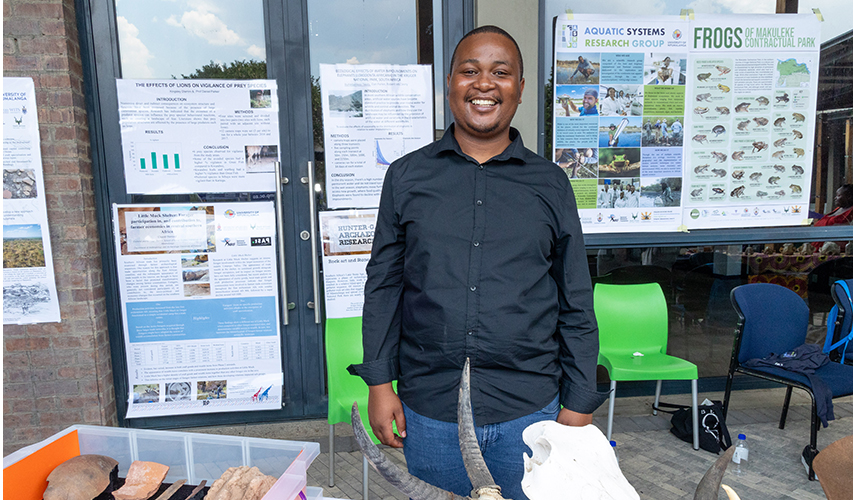UMP actively mentors and supports its postgraduate researchers, cultivating an environment that prioritises high-quality, impactful research across diverse disciplines. To empower young researchers, the University offers training in proposal writing, scholarly publishing, writing retreats, mentorship programmes, methodologies, data analysis, and seminar workshops.
Meet the University of Mpumalanga students driving innovation through research:
Name: Sinorita Chauke (Master of Science)
Topic: Exploring Indigenous Plants for Medicinal and Nutritional Benefits
Ms Sinorita Chauke, a Master of Science student, is making notable progress in her research on indigenous plants under the guidance of Dr Tshepiso Ndlovu. Her pioneering work investigates the medicinal and nutritional properties of indigenous plants traditionally used by local communities to treat various ailments.
“We work on medicinal plants and indigenous foods, analysing their elemental compositions about soil samples and their nutritional components, such as proteins, carbohydrates, and fibres,” explains Ms Chauke.
A key focus of her study is the antibacterial activity of indigenous plant species. She is testing plant extracts against Klebsiella pneumoniae and Pseudomonas aeruginosa – two bacteria associated with infections – and her findings are promising.
“Some extracts exhibit excellent antioxidant activity, addressing ailments caused by oxidative stress. Others display strong antibacterial properties, which could aid in developing treatments for skin infections and related disorders,” she says.
Her work includes ethnobotanical surveys, documenting medicinal plants used in communities for treating various ailments. Her research not only preserves traditional knowledge but also lays the foundation for new medical and nutritional applications of indigenous flora.
Ms Chauke's contributions underscore the untapped potential of indigenous plants to promote health and well-being, advancing science while honouring traditional practices.
Name: Research Team led by Hlangano Mahori (Master of Science)
Research Interest: Addressing Environmental and Social Challenges
Mr Hlangano Mahori, a geography student, represents a collaborative team of four researchers conducting studies that address critical environmental and socio-economic challenges in Mpumalanga Province. Their research encompasses five significant areas:
- Green Urban Spaces in Mbombela: This study analyses vegetation change in Mbombela over three decades (1993–2023) using the Normalised Difference Vegetation Index (NDVI). It highlights shifts in vegetation health and their implications for sustainable urban development.
- Drought Patterns in Mpumalanga: By employing the Precipitation Evaporation Index and rainfall data, this research examines drought trends across the province. The findings provide valuable insights for developing climate adaptation strategies.
- Challenges in Informal Settlements: The Case of Juju Valley: This study explores the growth of Juju Valley as an informal settlement, identifying socio-economic factors influencing its development. It sheds light on the challenges faced by residents, contributing to informed community development strategies.
- Water Service Delivery and Sustainable Development Goals: Focusing on areas such as Kanyamazane, Dantjie, and Kabokweni, this research evaluates water service delivery challenges and offers solutions to align with the Sustainable Development Goal of clean water and sanitation.
- Transformation of Rural Housing in Mbombela Municipality: This study examines changes in housing in Kanyamazane over the past decade, revealing a shift from traditional rural designs to modern urban styles, reflecting socio-economic progress.
These interdisciplinary studies exemplify UMP’s commitment to research that addresses real-world issues, demonstrating the positive impact of academic inquiry on local communities and sustainable development.

Name: Kingsley Dlamini (Master of Science)
Research Topic: Investigating the Role of Lions in Ecosystem Dynamics
Mr Kingsley Dlamini, a Master of Science student supervised by Professor Daniel Parker, is studying the ecological impact of lions (Panthera leo) on the behaviour and population dynamics of their prey in the Eastern Cape.
His research focuses on how apex predators influence prey species' population structures and behaviours, particularly their vigilance.
“Predators like lions create a ‘landscape of fear,’ shaping prey population demographics and behavioural responses,” he notes.
Mr Dlamini's work highlights the role of apex predators in maintaining ecosystem balance. “This research demonstrates the ripple effects apex predators have on ecosystems. Understanding these dynamics allows us to better manage and conserve biodiversity in protected areas,” he explains.
Name: Buhlebenkosi Twala (Master of Science)
Research Topic: Exploring Water Impoundments’ Effects on Elephants in Kruger National Park
Ms Buhlebenkosi Twala, a Master of Science candidate under the supervision of Professor Dan Parker and Robert McCleery, investigates the ecological effects of water impoundments on African elephants (Loxodonta Africana) in Kruger National Park.
“My research examines the seasonal distribution of elephants about water impoundments,” she explains that her study emphasises the importance of water availability and seasonality in shaping elephant movements and habitat use.
“In the dry season, elephants depend on permanent water sources, while in the wet season, they roam further afield for better-quality food.
Her research provides valuable insights into the ecological impacts of water management practices in protected areas, supporting the sustainable management of elephant populations and their habitats. “Balancing wildlife conservation with ecosystem health is crucial,” she says.
UMP remains committed to nurturing future researchers by providing access to experienced mentors, including established academics and retired professors, within and beyond the institution. These young scholars exemplify the University's mission to advance knowledge, innovation, and sustainable development.
Story by Cleopatra Makhaga. Pictures ©ChrisplPhoto.